Jan 13, 2017
Writes Solidarity Center’s Tim Ryan: “Over the past 20 years, awareness and activism around the issues of child labor, slavery and human trafficking have grown significantly, mirrored by both growing economic inequality and broad concerns about that inequity. [There] is a clear recognition that decent work for adults can create a more secure environment for children and their opportunities for education.”
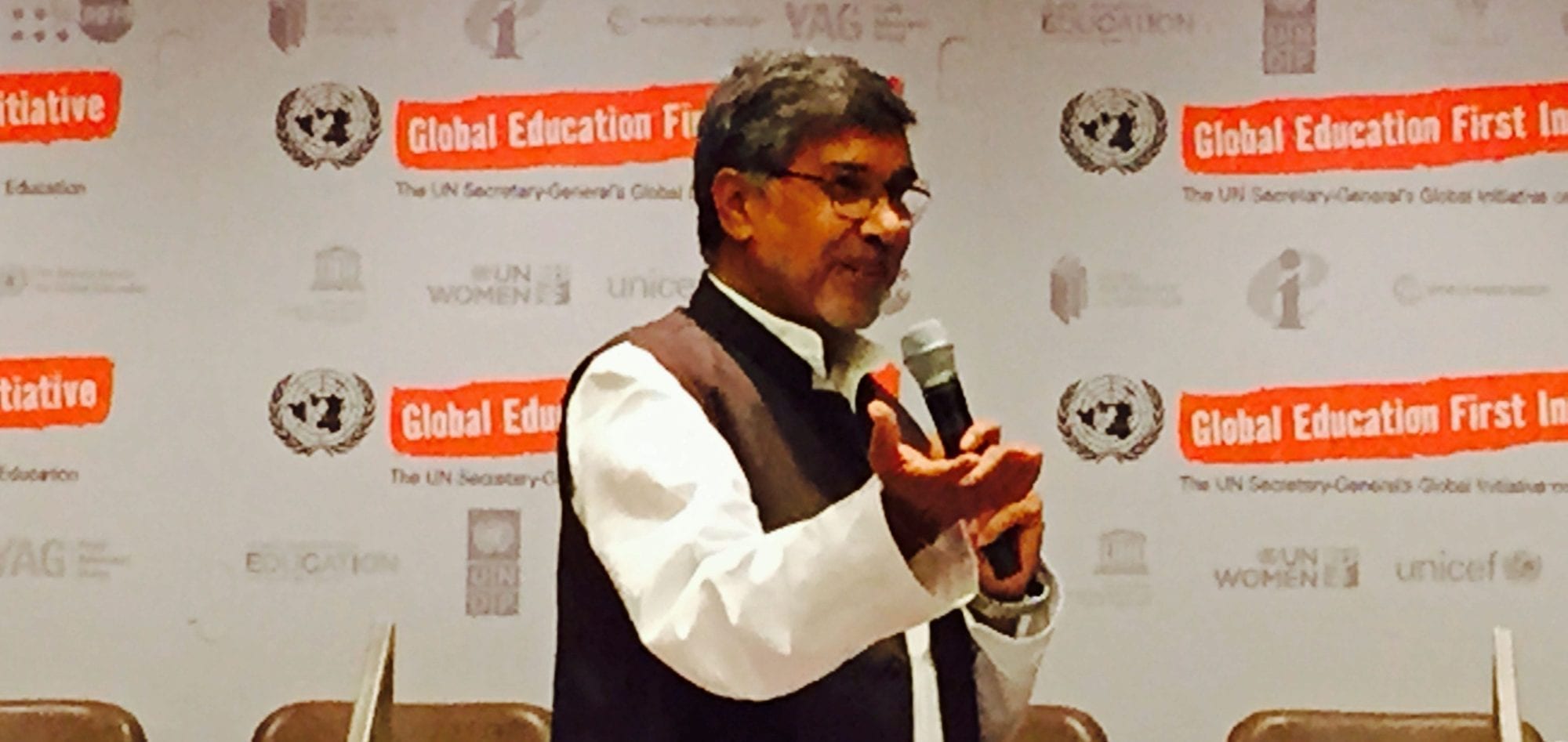
Sep 28, 2015
Last week the United Nations passed its next set of commitments for development, the “Sustainable Development Goals,” for the coming 15 years and added important labor issues that its member states are obligated to prioritize. “This is significant,” said child labor crusader and Nobel Prize Laureate Kailash Satyarthi at the UN Summit, “because for the first time these goals include the issues of child slavery, labor and trafficking, and has brought forth the language to address them.”
Satyarthi, a longtime friend and partner of the Solidarity Center, was one of the featured speakers at a UN Interactive Dialogue, in which dozens of heads of state and UN agencies discussed the new goals. While some governments and international agencies talked up free trade as the key to addressing economic equity and growing inequality, Satyarthi—along with governments such as Sweden, Ghana and the Dominican Republic—stressed a rights-based approach to development and putting workers and their rights first.
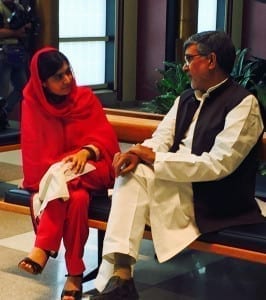
Nobel Prize winners Malala Yousafzai and Kailash Satyarthi talk at the UN General Assembly. Credit: Solidarity Center/Tim Ryan
“A sustainable economy and society can never be built on the foundation of slavery,” he said. “This is a new opportunity for civil society, faith organizations, governments and businesses to build genuine and innovative partnerships to make child slavery history.” Satyarthi also pointed out that the private sector “must shoulder its responsibility for the world’s children” and said that “truly visionary corporate leaders must safeguard children throughout their supply and value chain.”
Guy Ryder, secretary general of the International Labor Organization (ILO), echoed Satyarthi, saying that Goal 8—the creation of decent work—“is a key to the success of all other agendas, which depend on Goal 8.” While the incidence of child labor has dropped by about a third worldwide over the past 15 years, Ryder also called on the UN to not to spare any effort until the world is free of child and forced labor.
The inclusion of commitments to address child labor, slavery and human trafficking was the result of a multiyear lobbying and advocacy effort by the Global March Against Child Labor, Satyarthi’s organization, formed in 1997 to press for ILO Convention 182 against the worst forms of child labor. The convention has since been ratified by most countries around the world. Now the Global March and its allies have succeeded in centering the goal in the global development agenda, and advocates of justice and equity can hold governments accountable for making decent work for adults and ending child slavery the cornerstone for sustainable economic development.
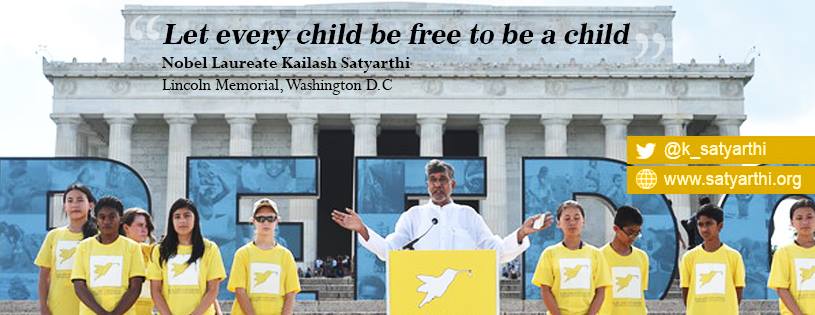
Jun 17, 2015
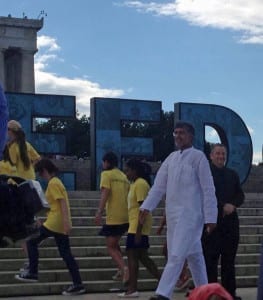
Nobel Prize winner Kailash Satyarthi led a rally against child labor at the Lincoln Memorial. Credit: Solidarity Center/Jeff C. Wheeler
Saying that “168 million children are producing wealth, producing clothes, producing shoes, the things that you and I use,” child rights advocate Kailash Satyarthi told a crowd gathered yesterday at the Lincoln Memorial in Washington, D.C.: “We are here to say that we denounce all forms of child slavery, of human slavery.”
On the 157th anniversary of Abraham Lincoln’s “House Divided” speech on slavery, Satyarthi, winner of the 2014 Nobel Peace Prize, spoke of the urgency with which child slavery must be eradicated. The Kailash Satyarthi Children’s Foundation organized the meet-up for childhood freedom June 16, days after the global community marked World Day Against Child Labor.
Many of the 168 million child workers around the world are forced into slavery or prostitution or serve as child soldiers. Most, Satyarthi said, work in hazardous and even life-threatening conditions. While this number is down from 246 million in the 1990s, Satyarthi said there is still a long way to go.
“Every child should be free to be a child,” he declared. “Every child should be free to love, free to play, free to go to school, free to have a dream.”
Satyarthi called for organizations to work together to end child labor. “I have worked with civil society, I have worked with trade unions, I have worked with teachers’ organizations,” he said. He explained how such organizations are vital to promoting human rights, especially for children. “Companies like child labor because it is cheap, because children can be easily exploited,” he said. “Children cannot form unions, they cannot go to the polls.”
Satyarthi recalled the visions of freedom activists who came before him, including not only Abraham Lincoln but also Martin Luther King, Jr., Mahatma Gandhi and Nelson Mandela. “I feel pain,” Satyarthi said. “I am angry that we have not been able to pay the real tribute to these men by eradicating slavery.”
He also insisted that child labor and poverty could not be vanquished without serious investment in education. He lamented poorly financed school systems in some developing countries, where funds for education amount to less than three percent of gross domestic product. Children’s education also receives less than one percent of humanitarian aid worldwide, Satyarthi reported.
“We cannot have a just, dignified world without education,” he declared. “My children in the world cannot wait. Freedom must happen now.”
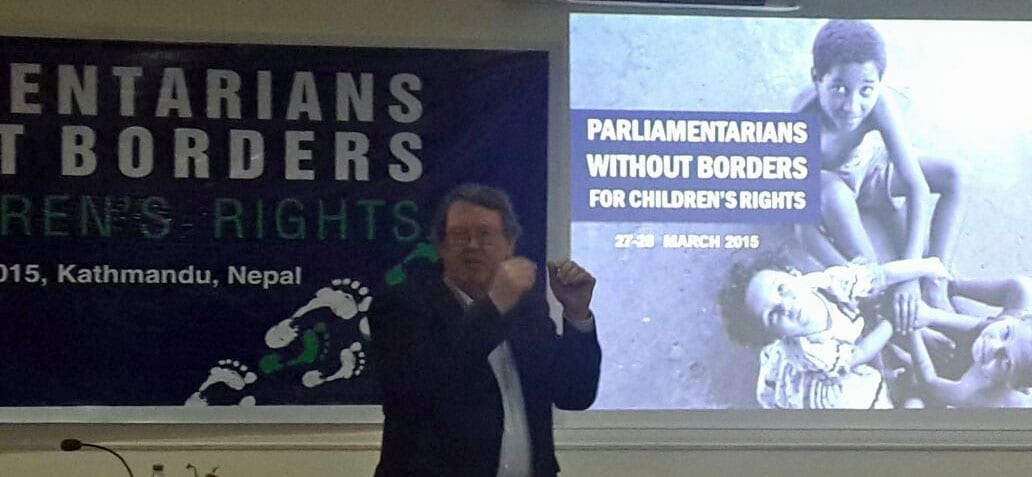
Mar 27, 2015
Twenty years ago, child labor was the norm in many countries around the world but “today, that is not the case,” said Tim Ryan, Solidarity Center Asia Director. “Child labor is not acceptable. Changing attitudes can be accelerated.”
Ryan spoke yesterday at a gathering of elected lawmakers from Asia and Latin America about the importance of focusing on the abolition of child labor in their parliaments. “Parliamentarians Without Borders for Children’s Rights,” a two-day gathering in Kathmandu, Nepal, drew participants from Afghanistan, Bangladesh, Brazil, India, Nepal, Netherlands, Pakistan, Paraguay and Turkey.
Speaking in his role as North American board member of the Global March Against Child Labor, which sponsored the event, Ryan also pointed out the intrinsic connections between child labor, equitable economic development and promoting healthy democratic societies that work for all citizens.
“It’s incumbent upon you as elected leaders to contribute to that democratic process and be responsive to your constituencies by connecting the issues of child labor, education and decent work for children’s parents.”
He also pointed out connections between the U.S. civil rights movement and Gandhian principles and practices centering on the peaceful self-determination of impoverished citizens seeking economic equality, strategies fundamental to Global March Against Child Labor leader Kailash Satyarthi and his colleagues in combating child labor.
Noting that it takes time to make significant social change, Ryan cited the experience of abolishing slavery in the United States.
“Even after America’s Civil War, it took 100 years for African-American citizens’ rights to be enshrined in law and respected,” said Ryan. “And that fight still isn’t over.”
Ryan addressed the meeting at the invitation of Nobel Prize winner Satyarthi, a long-time Solidarity Center ally.
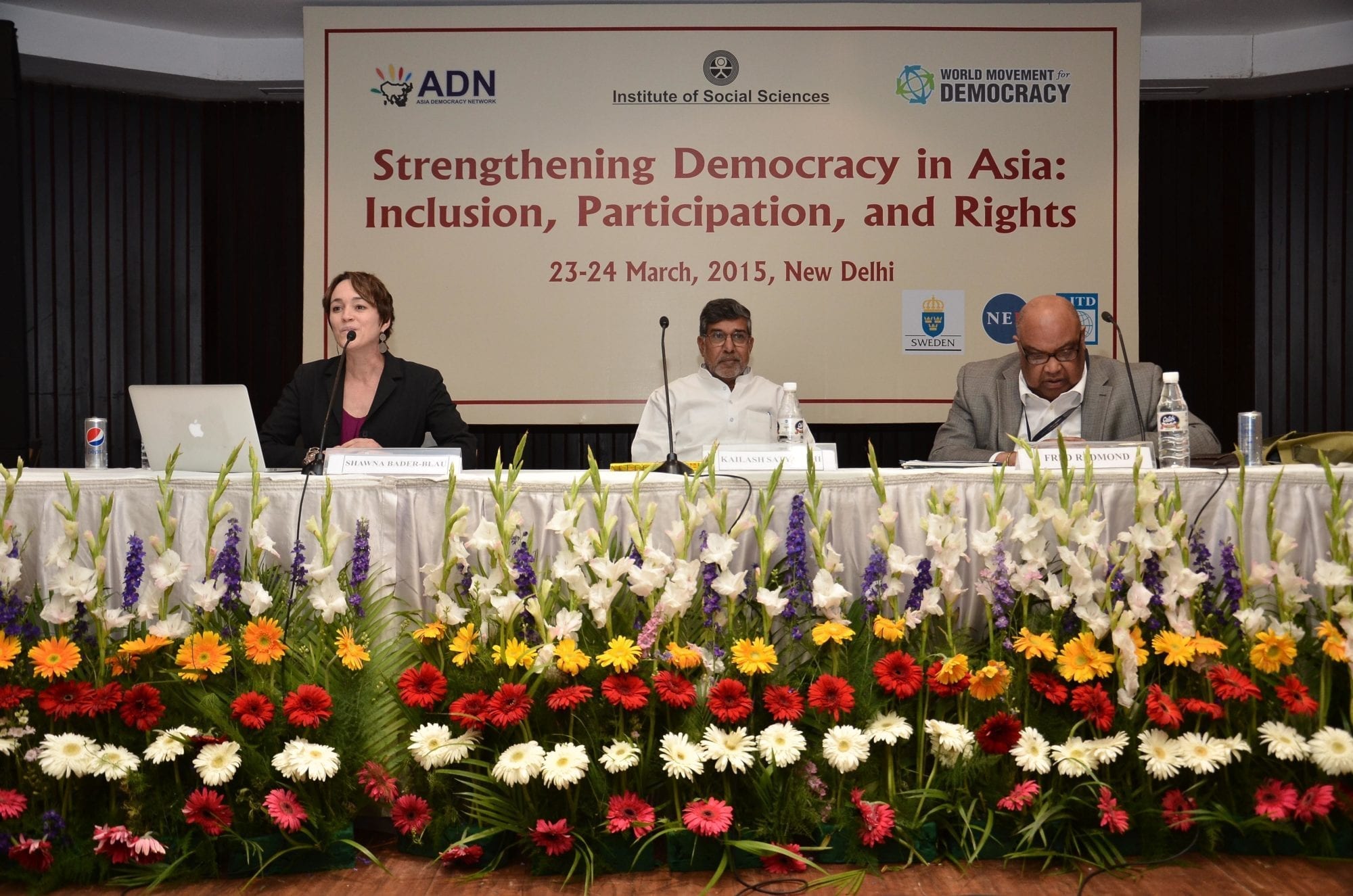
Mar 25, 2015
The United States and India are connected by a common philosophy and a common history of resistance to oppression. And trade unions are key to greater equality and inclusion, said Fred Redmond, international vice president of the United Steelworkers, at a conference in Delhi this week that focused on how democracy in Asia can be strengthened through inclusion, participation and rights.
“Today in the United States and around the world, social cohesion is threatened by rising inequality and the economic and social marginalization of large segments of the population. The breakdown of institutions, such as labor unions, that promote equality and opportunity and participation, creates not only a skewed distribution of resources but also a breakdown of trust,” said Redmond, who joined with Nobel Peace Laureate Kailash Satyarthi Monday to explore the global march for dignity and democracy.
They highlighted the common thread running through social movements around the world: Gandhi’s philosophy of peaceful disobedience, which brought India independence, shaped the U.S. civil rights movement and continues to serve as a foundation for people around the world seeking justice and equality. Solidarity Center Executive Director Shawna Bader-Blau moderated their discussion.
Satyarthi, founder of Global March Against Child Labor and a lifelong campaigner for children’s rights, emphasized that the lack of economic security hinders the flourishing of democracy. When workers have no jobs, they also have no opportunities to join unions, which enable them to secure living wages and social protections like health care, said Satyarthi. He added that workers who lack economic security are often forced to send their children to work. The Solidarity Center has worked closely with Satyarthi for years to help end child labor.
Satyarthi and Redmond made their remarks as part of a panel discussion at the Strengthening Democracy in Asia conference organized by the Institute of Social Sciences (ISS), Asia Democracy Network and the World Movement for Democracy held March 23–24.
Also at the event, Solidarity Center Asia Director Tim Ryan moderated a panel discussion on strategies to promote democracy among marginalized workers featuring Redmond; Manali Shah, national secretary of the Self Employed Women’s Association (SEWA); and Ramachandra Khuntia, vice president of Building and Wood Workers International.






